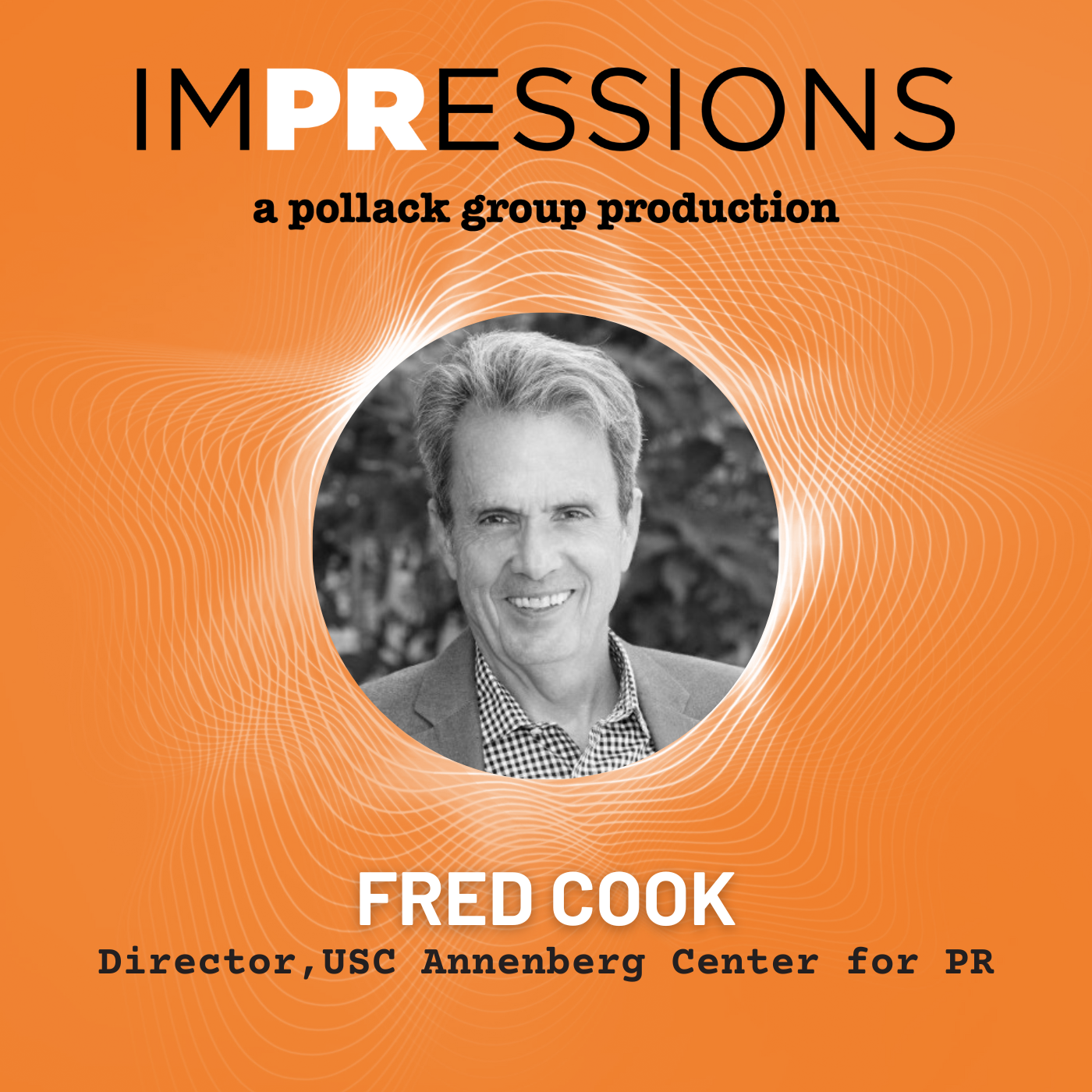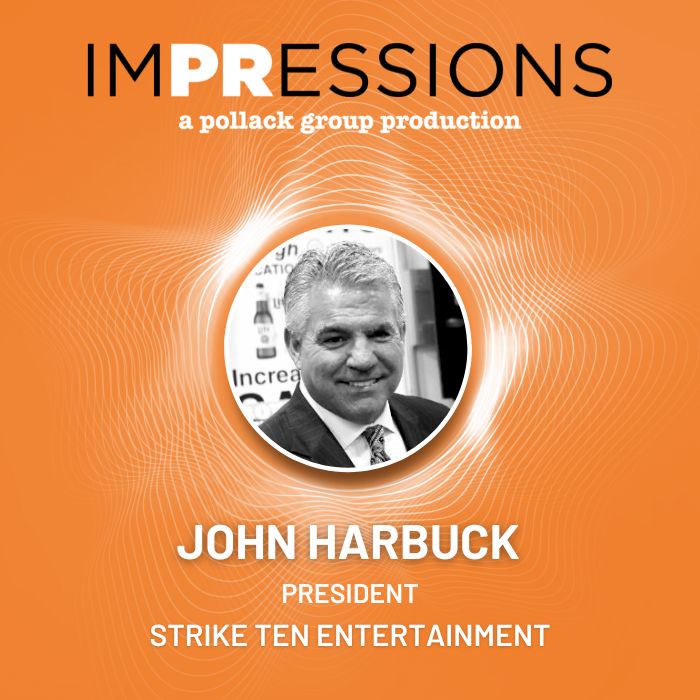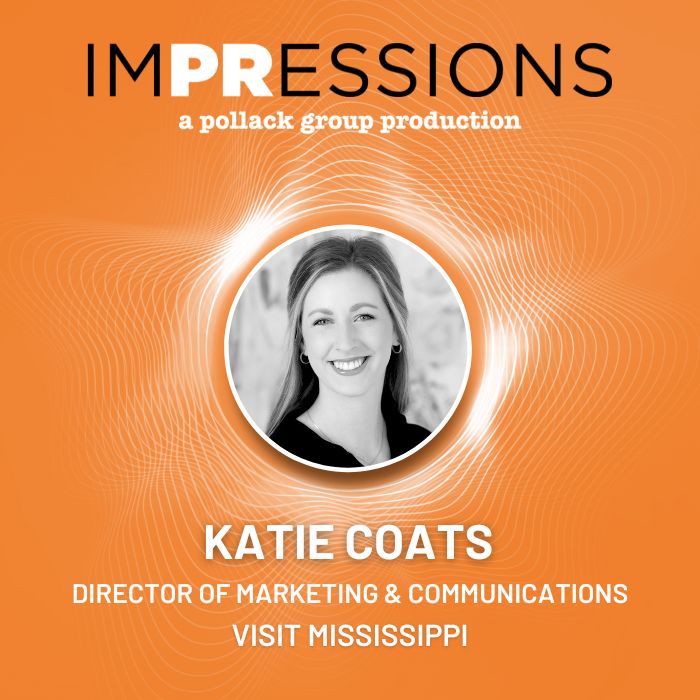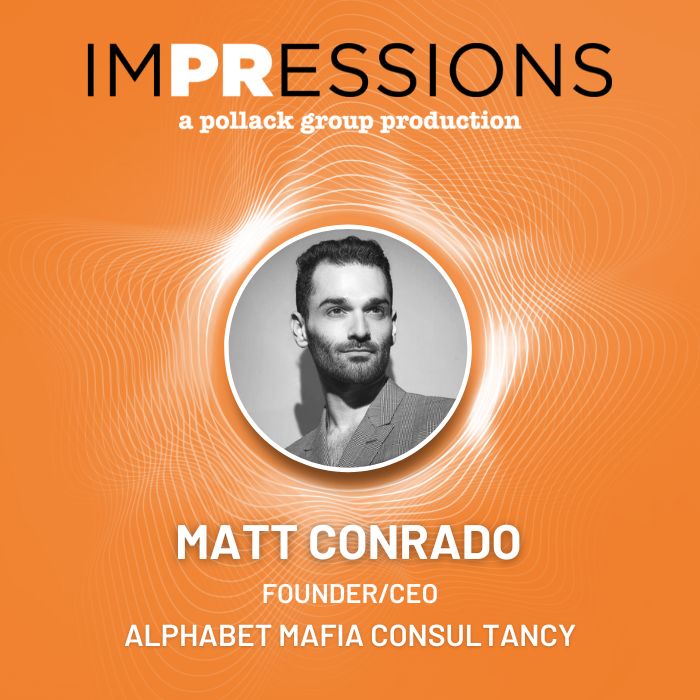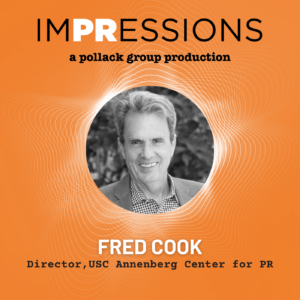 The only constant about the world of PR; it’s continuously transforming. From the early days of faxing a press release to the evolution of social media and artificial intelligence, PR continues to ride the waves of communications changing tides. In this episode, Jenn and Kalli chat with Fred Cook, director of the USC Center for Public Relations at the University of Southern California, to discuss current trends, what PR agencies need to be mindful of, and what’s in store for the dynamic industry.
The only constant about the world of PR; it’s continuously transforming. From the early days of faxing a press release to the evolution of social media and artificial intelligence, PR continues to ride the waves of communications changing tides. In this episode, Jenn and Kalli chat with Fred Cook, director of the USC Center for Public Relations at the University of Southern California, to discuss current trends, what PR agencies need to be mindful of, and what’s in store for the dynamic industry.
Impressions # 3 Transcript
Kalli: Like many industries, PR in particular has drastically changed through the years. Gone are the days when a PR specialist would fax a press release or call a reporter to pitch a story. Today, thanks to the evolution of technology, we have multiple avenues to quickly communicate with the media and get our news published. The PR model is constantly changing, and today we’re welcoming Fred Cook, director of the USC Center for Public Relations at the University of Southern California, where he works to shape the future of PR through research, education, and thought leadership. Fred, thanks for joining us today.
Fred: Oh, I’m happy to be here. Thank you.
Kalli: Of course. So, let’s dive right in. As the industry has shifted from faxed press releases to all things digital, what is the most significant trend that agencies need to stay on top of to be successful?
Fred: That’s a good question. I think there are a number of trends that agencies need to stay on top of, and one of them is related to how people are receiving information. There are a lot of new platforms out there that people are using for communication. TikTok is probably the most remarkable one that’s grown over the past few years, and I think it has shown people that information can be shared in a lot of really interesting formats. It started off as a sort of a youth-oriented platform, and now everybody’s on it. So, I think staying on top of new platforms is really important, and I also think staying in touch with the audiences that you’re trying to reach. The demographics have changed remarkably, and we have younger generations who do not watch television, they do not read magazines or newspapers, and understanding how those people receive information is critically important. So, for agencies, there’s a lot of new developments that require a constant sort of changing of the way you work and the way you think about communications.
Jenn: It is kind of one of the unique parts of working in PR and working in an agency. Things are always constantly changing and evolving, and that’s something that I love the most about our industry. Although I will admit I am not on TikTok. I think I need to get on it, but other than that, I’m pretty well versed in the digital world.
Fred: Yeah, you should be. I’m on TikTok. Yeah, of course.
Jenn: I love that’s the thing. I know I’m going to love it and I know it’s going to suck me in and I’m already on my phone too much to begin with. That’s kind of why I’ve avoided it but, I will definitely get on it. So, with the shift to digital, there are many new channels in which brands can communicate with their target audiences, as we just described. But do you think that agencies need to focus their efforts on certain channels such as social media or influencer relations? Or do you think that there really can be a one stop shop for all communication needs?
Fred: The answer is it depends. I think that an agency like Golin, the one that where I’ve been for all these years, I think we’re big enough to have highly developed skills and experience in a lot of different categories. So, for us, it makes sense to be all things to all people. And there’s an advantage for a client to work with an agency that can do everything but, then for smaller agencies that don’t have the resources to be experts in everything, I think focusing on one or two areas can be really effective. And there are clients out there who are looking for specialists in these fields and feel more comfortable working with a social media specialist or an influencer specialist and that sort of thing. And so, I think there’s opportunities for both, probably the hardest part is to be a medium sized agency and try to be a specialist or more like a large multifaceted agency. It’s a little harder for them to be one of those two things.
Kalli: Really interesting take on it and I think it makes sense. If you have more people, you have more, you know, more skills there and you’d be able to handle, you know, having that dedicated team to specific, you know, whether it’s influencer relations or, you know, a social media team. But obviously the less people you have, the more power you the less power you would have behind that.
Fred: Yeah. And there are still things that – Golin is one of the biggest agencies in the top ten, probably, but we don’t do investor relations and we don’t do a lot of political work. There are some agencies do a lot of mergers and acquisitions.
Kalli: Right.
Fred: That is not a specialty of ours, but we can support that. So, there’s lots of opportunities, I think, for specialization and for generalization in this business right now.
Kalli: That’s very true. With so many topics to talk about… Just speaking about, you mentioned that Golin is one of the top ten as agencies are adapting to new technologies and techniques to stay ahead in the PR game, what does that mean for an agency? Like a goal, and that’s a legacy agency that they’re huge and they’ve been around for such a long time and really have made their mark. Are they able to shift and to compete with these digital first agencies without losing their core identity?
Fred: Well, that’s a very good question. And probably eight years ago or so, we shifted our entire business model to something called G Four because we realized that the whole communications were changing dramatically, and the agencies were all staying the same. So, we went from being a sort of a generalist approach to a specialist approach. And we created instead of this hierarchy of positions like from everything from senior account executive, senior account supervisor, and account coordinator. We shifted away from that to be four communities that specialize in ideas and media and creative and planning that’s worked out really well for us. And I think a lot of the other larger agencies, we were the first to do that but I think a lot of the other big agencies have followed and have moved to a more specialized model so that they can compete in all these different areas and not just be sort of this traditional model of people who all do the same thing, only some people have been doing it longer than other people.
Jenn: So, for Pollack, for instance, we’re kind of an agency that does a little bit of everything, which is awesome. We’re marketing, we’re PR, we’re digital. And we are sort of seeing a trend of a lot of pop up, smaller digital first agencies, or agencies that only focus on the digital market. Do you think that these have an advantage or a disadvantage next to your more traditional agency like ours?
Fred: It depends on who the client is, who you’re trying to work with. I think there’s some people that want that specialization, and other people would like a little broader level of service, and it depends on them. But I have seen as each new trend evolves, specialist agencies emerge. And that only do that one thing. I think in the beginning, when social media was on the horizon, there were lots of agencies who popped up that only did social media, and they were very successful for a period of time. And then, as everyone else learned how to do that, they sort of faded away or they changed their service, offering, I think, influencers the same way. There’s a lot of companies that are just focused on influencers now.
But whether or not they’re going to be able to survive over the long period of time, time as everyone else builds that expertise, remains to be seen. So, I think if you’re a specialist agency, you have to be really nimble in terms of what your specialty is because things change so fast. You can be an agency that focused heavily on Facebook and now what, what happens when TikTok becomes the platform of choice? You’ve got to really make sure that you’re moving quickly to stay on top of those trends.
Kalli: That’s a really great point because, you know, as we’ve all seen, especially, you know, since the digital boom, things have really moved so quickly and you have to be able to, to adapt and try to be on top of the trends, you know, before we move on from them. And that being said, turnover has become a big problem for agencies, both legacy and startup. During and now coming out of the pandemic, what’s your advice to agencies looking to keep employees happy?
As now employees are changing and seeking benefits that go beyond having a great culture and Pizza Fridays, they’re looking for a little bit more, to be satisfied?
Fred: It’s a great question and I’m not sure I have the answer. As somebody that’s been with an agency for 30 something years, more than 35 years, I’m very conscious that people who come to work for us are not going to do that. Probably a few might, but most will have shorter terms with us. And especially now that so many people are working remotely, that your corporate culture has to change to adapt to this remote work style. Because you’re not in the office, you’re not seeing people all the time, so you’re not able to communicate your culture in the same way that you do in an office environment.
So, I think it’s up to agencies to figure out how to replace that communal feeling. And that part being part of an organization when people are not there with one another very much. And that, I think, is the challenge of the day. How do you create a corporate culture when that everyone’s working from a different place? People are having parties online and doing events online to sort of compensate for the being in the same place, but long term, I don’t think that’s going to be successful. And I think it’s to some degree, we’ve got to figure out how to create these communities when people come to the office and when they don’t. And otherwise, the turnover is going to continue to increase because people are not going to feel the connection with one another or the connection with a particular company that we were able to create in the past. So, I think we’re still looking for those answers. I think every agency is trying to figure out what it is they can do to make people feel part of that brand and feel part of that company, so they’ll stay there a long time.
Jenn: Has there been anything specific that has worked for you and your agency, especially since you’ve been in the field for so long and then going through something like the pandemic where everything switched to remote and now people are coming back into more of a hybrid model in the workplace? Has there ever been anything specific for you that has worked for your staff and your agency in that regard?
Fred: Well, it’s interesting because I was the CEO before the pandemic, and during the pandemic, Matt Neal has been the CEO. I was sort of managed by walking around. I spent a lot of time in our offices, just spent just walking around and talking to people. And that was the way that I managed as a senior manager. Matt is very good online. He does these regular town halls. He does a lot of one-on-one conversations with people and in small groups and with clients. He’s excellent online, and I think he’s got skills that I didn’t have in that capacity. I was better in person. It’s going to require a different kind of manager, I think, in this new environment. And the second thing, I think that agencies have to be aware of, and any company has to be aware of, that people have gotten used to this flexibility of working from home or working a few days in the office and having time off to work elsewhere. I think that the companies that are going to demand that people come back into the office long term are going to be competing with companies who offer their employees more freedom and more flexibility.
I think the companies that offer more flexibility are going to get the best people.
Jenn: Agreed. Yes.
Fred: That’s going to be challenging. I was in our office in Chicago last week on Friday, and there were very few people there, but they’re all home working, and we’re having a great year this year, even though everybody’s working remotely.
We did last year too. So, we’ve discovered that we can do this successfully without being in the office all the time. But we just have to figure out how to make people feel part of that culture and still enjoy the flexibility that they want, that we know that they want.
Jenn: Right. And a hybrid workforce is a great example of something that is kind of new and something that is kind of part of this overall change in the industry. I want to ask you a little bit about the PR days before social media before the modern world that we live in today. If you had to kind of compare a day in the life maybe 20/30 years ago or so, and one now, I think we know what some of those main differences are, but what are some of the similarities, too? I mean, there are some components of PR that have probably remained pretty constant through the years, I imagine.
Fred: The one thing I love about being in this industry is it’s very dynamic. It’s always changing. So, it’s always interesting, it’s always challenging, it’s always kind of fun. When I first started at a small agency in Los Angeles that was ultimately bought by Golin, I did everything budgeting, I did media, I did client calls, I did creative briefs, I did planning. It’s like you did a little bit of everything and I wasn’t that good at any of it, but I did it all. And I think that was the way things were done back then. You were sort of a generalist and you tried to do everything, everybody did everything. And today, I think it’s like the medical field, there are general practitioners that do everything, but a lot of times when you need something, you go to specialists.
So, I think the biggest difference is agencies have specialized now, and we’re hiring people that do all kinds of different jobs, whether they’re designers or producers or writers or creatives or statisticians or analysts us. And I think that’s the major difference is like at our students at USC, working in part PR, they can go into dozens of different areas, expertise, and still work in public relations. And I think that’s what’s made it really exciting and how it’s changed so much in terms of what’s the same. I think that what’s the same is we’re still telling stories. We’re still taking something ordinary and making it special so people will appreciate it, so they’ll share it, so they’ll read it, so they’ll want to talk about it. And I think that that’s the same. It’s just we’re using different tools to do that than we did before. At the heart, I think we’re still trying to tell stories about our client’s products and their people and their company and their purpose that are going to be meaningful to their audiences that they care about.
Kalli: That’s so true. And actually, storytelling is the reason that I got into PR, because I always loved reading and all the different stories. So being able to do that as a job, it’s really a wonderful thing for people like us that that really means something to however, that being said, one of the things that makes our job so challenging is that stories are being told 24/7. And now in today’s world, a lot of brands are expected to be a part of, if not lead many cultural conversations as well as talking about their own stories. I know in the USC Relevance report, you spoke about polarization…How can PR professionals navigate guiding their clients’ communications around such polarizing events and conversations that previously wouldn’t have been a part of their story?
Fred: That’s a great question. And what we’ve been studying at USC, the Center for Public Relations, for the past few years, and that is the role of business in society. And what we’re seeing is that whether businesses like it or not, they’re having to address a lot of issues that they never did before. And most of them are societal issues, and many of them are very controversial, whether they’re related to gun control or Roe v. Wade or immigration or social justice. And companies are having to take a position on some of these issues that may not have anything to do with their business. And some of these issues are very polarizing.
So, you run the risk of when you make a statement about something or you commit to trying to solve a certain problem, you run the risk of alienating the people who disagree with that position. And some of them might be your customers, some of them might be your employees. So that’s made our jobs even more complicated, because now we have to understand the dynamics of very complex political issues, and we have to be able to explain to the risks and rewards to our clients and to our bosses about getting involved in these issues. And we see it happening every single day. These conversations are taking place inside companies is what should we address? How many issues can we actually tackle as an organization? What should we be saying about it? And what are the risks associated with that? And I think this is not going away. I think it’s just going to get more and more intense, and it puts public relations people right at the heart of this conversation. And our jobs become very important, but they’re also very challenging to figure out what’s the right way to navigate this sort of tricky territory.
Kalli: Couldn’t be more right about that, Fred. And as the world of PR continues used to transform and become even more tricky, we’ll stay mindful of the industry changes.
And above all, we’re thankful to know someone as rich in PR knowledge as you are Fred, thank you so much for joining us today and sharing your insight with our listeners. It’s been a pleasure.
Fred: Well, thank you for having me. I’m not sure that I know that much about it, but we’re always trying to figure out what’s next, and I believe whatever’s next is going to be really interesting and I hope will be on top of it. Thanks.

